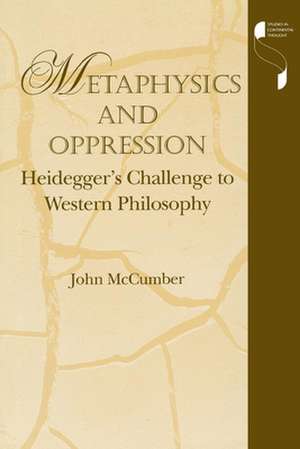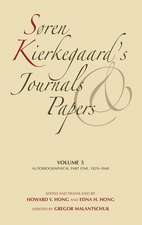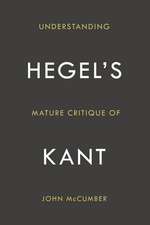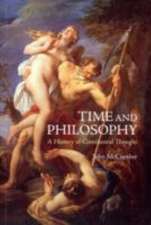Metaphysics and Oppression – Heidegger`s Challenge to Western Philosophy: Studies in Continental Thought
Autor John Mccumberen Limba Engleză Paperback – 21 noi 1999
Din seria Studies in Continental Thought
-
 Preț: 280.12 lei
Preț: 280.12 lei -
 Preț: 136.59 lei
Preț: 136.59 lei -
 Preț: 174.22 lei
Preț: 174.22 lei -
 Preț: 137.37 lei
Preț: 137.37 lei -
 Preț: 247.15 lei
Preț: 247.15 lei -
 Preț: 198.40 lei
Preț: 198.40 lei -
 Preț: 154.65 lei
Preț: 154.65 lei -
 Preț: 101.92 lei
Preț: 101.92 lei -
 Preț: 153.86 lei
Preț: 153.86 lei -
 Preț: 389.98 lei
Preț: 389.98 lei -
 Preț: 211.94 lei
Preț: 211.94 lei -
 Preț: 306.21 lei
Preț: 306.21 lei -
 Preț: 234.78 lei
Preț: 234.78 lei -
 Preț: 160.61 lei
Preț: 160.61 lei -
 Preț: 242.38 lei
Preț: 242.38 lei -
 Preț: 102.86 lei
Preț: 102.86 lei -
 Preț: 377.88 lei
Preț: 377.88 lei -
 Preț: 296.30 lei
Preț: 296.30 lei -
 Preț: 400.38 lei
Preț: 400.38 lei -
 Preț: 165.19 lei
Preț: 165.19 lei -
 Preț: 125.43 lei
Preț: 125.43 lei -
 Preț: 165.56 lei
Preț: 165.56 lei -
 Preț: 123.66 lei
Preț: 123.66 lei -
 Preț: 164.60 lei
Preț: 164.60 lei -
 Preț: 183.28 lei
Preț: 183.28 lei -
 Preț: 159.12 lei
Preț: 159.12 lei -
 Preț: 185.48 lei
Preț: 185.48 lei -
 Preț: 396.72 lei
Preț: 396.72 lei -
 Preț: 162.98 lei
Preț: 162.98 lei -
 Preț: 280.98 lei
Preț: 280.98 lei -
 Preț: 189.22 lei
Preț: 189.22 lei -
 Preț: 226.81 lei
Preț: 226.81 lei -
 Preț: 193.04 lei
Preț: 193.04 lei -
 Preț: 162.69 lei
Preț: 162.69 lei -
 Preț: 186.17 lei
Preț: 186.17 lei -
 Preț: 296.85 lei
Preț: 296.85 lei -
 Preț: 196.35 lei
Preț: 196.35 lei -
 Preț: 313.29 lei
Preț: 313.29 lei -
 Preț: 292.81 lei
Preț: 292.81 lei -
 Preț: 319.66 lei
Preț: 319.66 lei -
 Preț: 224.69 lei
Preț: 224.69 lei -
 Preț: 264.06 lei
Preț: 264.06 lei -
 Preț: 229.91 lei
Preț: 229.91 lei -
 Preț: 323.70 lei
Preț: 323.70 lei -
 Preț: 131.81 lei
Preț: 131.81 lei -
 Preț: 158.82 lei
Preț: 158.82 lei -
 Preț: 255.26 lei
Preț: 255.26 lei
Preț: 230.29 lei
Nou
Puncte Express: 345
Preț estimativ în valută:
44.07€ • 45.95$ • 36.63£
44.07€ • 45.95$ • 36.63£
Carte tipărită la comandă
Livrare economică 20 martie-03 aprilie
Preluare comenzi: 021 569.72.76
Specificații
ISBN-13: 9780253213167
ISBN-10: 0253213169
Pagini: 360
Ilustrații: 3 b&w photos
Dimensiuni: 156 x 235 x 15 mm
Greutate: 0.56 kg
Editura: MH – Indiana University Press
Seria Studies in Continental Thought
ISBN-10: 0253213169
Pagini: 360
Ilustrații: 3 b&w photos
Dimensiuni: 156 x 235 x 15 mm
Greutate: 0.56 kg
Editura: MH – Indiana University Press
Seria Studies in Continental Thought
Cuprins
Table of Contents:
Proem
Introduction: Two Heideggers and Their Challenge
Part 1: The Codification and Consolidation of Ousia (Aristotle and Aquinas)
1. Aristotle's Concept of Ousia
2. Ousia as Parameter in Aristotle
3. The Docility of Matter in Thomas Aquinas
4. Two Ancient Engines of Oppression
Appendix to Part 1: Plato and Prehistory
Part 2: The Modern Eviction of Ousia (Descartes, Hobbes, Locke, Hume)Introduction to Part 2
5. The Cartesian Relocation of Ousia
6. Ousia and Sovereignty in Hobbes
7. Ousia and Property Rights in Locke
8. The Triumph of the Individual in Hume
9. Critical Accounts of Oppression in Mudimbe, Douglass, de Beauvoir
Appendix to Part 2: Ousiodic Structures in Spinoza and Leibniz
Part 3: Heidegger's Challenge to Ousia
10. Heidegger's Presentation of Diakena in Being and Time
11. Diakena and Thing in the Later Heidegger
12. Conclusion
Notes
Bibliography
Index
Proem
Introduction: Two Heideggers and Their Challenge
Part 1: The Codification and Consolidation of Ousia (Aristotle and Aquinas)
1. Aristotle's Concept of Ousia
2. Ousia as Parameter in Aristotle
3. The Docility of Matter in Thomas Aquinas
4. Two Ancient Engines of Oppression
Appendix to Part 1: Plato and Prehistory
Part 2: The Modern Eviction of Ousia (Descartes, Hobbes, Locke, Hume)Introduction to Part 2
5. The Cartesian Relocation of Ousia
6. Ousia and Sovereignty in Hobbes
7. Ousia and Property Rights in Locke
8. The Triumph of the Individual in Hume
9. Critical Accounts of Oppression in Mudimbe, Douglass, de Beauvoir
Appendix to Part 2: Ousiodic Structures in Spinoza and Leibniz
Part 3: Heidegger's Challenge to Ousia
10. Heidegger's Presentation of Diakena in Being and Time
11. Diakena and Thing in the Later Heidegger
12. Conclusion
Notes
Bibliography
Index
Recenzii
In this stunning philosophical accomplishment, McCumber (Northwestern Univ. and author of Poetic Interaction, 1989, and The Company of Words, 1993) sheds important new light on the history of substance metaphysics and Heidegger's challenge to metaphysical thinking. He carefully analyzes use of the concept of ousia in Aristotle, Aquinas, Descartes, Hobbes, Spinoza, Leibniz, Locke, and Hume. He finds in Aristotle three defining aspects of ousia: 1) everything occurs only within a boundary; 2) through disposition, everything is hierarchically arranged, and 3) through active initiative, form imposes itself on matter. He shows how the metaphysical concept of ousia, by defining the way things are, justifies as rational such social structures as slavery, colonialism, and male domination of women. In each case, rational form imposes itself on irrational matter. Historically, this has offered a conceptual rationale for oppression, but the analysis of Heidegger offers a positive alternative. Heidegger blurs ousia with metaphysics of presence; his thinking breaks through boundaries, does not impose a top--down hierarchy on nature and society, and does not relegate some things or people to the category of matter. Thus, significantly, Heidegger's critique of substance metaphysics offers a way beyond oppressive thinking. Well--documented, brilliant, definitely a major contribution to philosophy! Upper--division undergraduates and above.R. E. Palmer, emeritus, MacMurray College, 2000apr CHOICE.--R. E. Palmer, emeritus, MacMurray College, 2000apr CHOICE.
Notă biografică
John McCumber is Professor of German at Northwestern University. He is author of Poetic Interaction: Language, Freedom, Reason and The Company of Words: Hegel, Language, and Systematic Philosophy.
Descriere
Reinterprets the history of metaphysics from Aristotle to the present in the light of Heidegger's unrecognized challenge to oppression.


















